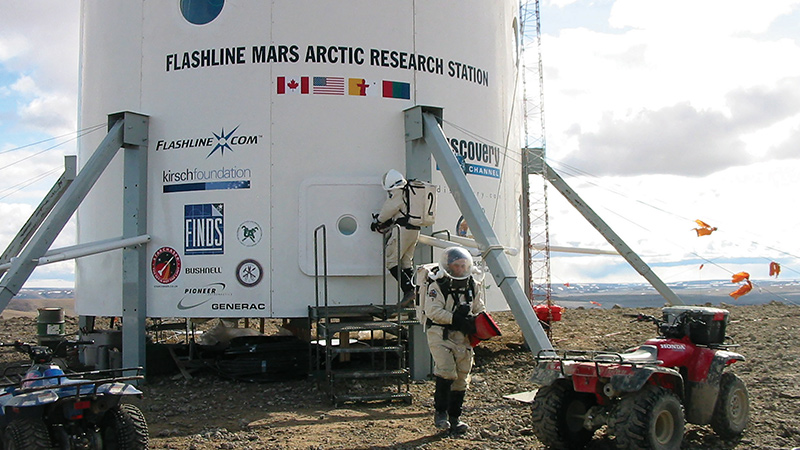Selling Mars as Planet B
By Tom Risen|June 2017
Some advocates say species survival is best reason for mission
Science fiction has dramatized the idea; physicist Stephen Hawking argues its urgency and Elon Musk founded SpaceX to pursue it. It’s the notion that humans must build a colony on Mars as a backup planet to ensure humanity’s survival if Earth becomes uninhabitable.
Hawking has for years touted interstellar travel as the preferred way to one day propel humanity to outlive what he sees as the increasing risk of extinction from natural and human-made disasters on Earth. The pioneering physics professor at the University of Cambridge has also mentioned Mars or the moon as near-term safe havens.
“Hawking thinks the human species will have to populate a new planet within 100 years if it is to survive,” says the BBC in a press release about his upcoming TV documentary, “Expedition New Earth.” The BBC explains: “With climate change, overdue asteroid strikes, epidemics and population growth, our own planet is increasingly precarious.”
Musk has long favored Mars colonization as a means to survive what he calls an “inevitable” extinction event on Earth. On its website, SpaceX says that the company was founded in 2002 “with the ultimate goal of enabling people to live on other planets.” The tech entrepreneur reiterated that survivalist message in September at the International Astronautical Congress in Mexico, saying humans have to become “a multiplanetary species” and build complete cities on Mars with all the amenities, including “iron foundries, pizza joints, you name it.”
Voices in popular culture and social media have echoed this argument for why NASA and its presumed international partners should spend years of work and billions of dollars sending humans to Mars. Interviews with a broad range of scientists and futurists, however, reveal skepticism about the wisdom and feasibility of selling Mars as “Planet B.”
The implication that Mars colonization should be prioritized over fixing Earth’s problems, such as climate change, unsettles Katharine Hayhoe, director of the Climate Science Center at Texas Tech University.
“Mars is not an escape hatch for planet Earth,” Hayhoe says. “If we do not take action to reduce and eventually eliminate our carbon emissions, they will overwhelm human civilization as we know it, long before Mars is ready to be colonized by large numbers of people.”
A Mars colony would need a huge investment of supply ships to keep settlers alive in the toxic, freezing Martian environment, but the numerous abandoned bases in Antarctica show that building cities in less hazardous places on Earth is difficult enough. Advocates of a colony tout the potential to mine water and rare minerals on the red planet, but searching for resources or avoiding a potential asteroid strike on Earth are not immediate enough motivations to inspire a Mars settlement, says Andy Weir, author of “The Martian,” which depicts an astronaut stranded on Mars.
“I don’t believe there will ever be a permanent settlement on Mars or the moon or anywhere else off Earth until there’s an economic reason for it,” Weir says. “Whatever Earth’s problems are, it’s considerably easier to fix Earth than it is to colonize Mars.”
Weir and others consider Mars an inhospitable place where the first goal should be research rather than settlement, at least for the near future. Pascal Lee, a planetary scientist at NASA’s Ames Research Center in California, points to exploration of Antarctica as a realistic model for how Mars might be studied. International research stations on Antarctica host rotating scientific teams, and this strategy has kept a sustained but limited human presence there.
“There is an escapism to wanting to go to Mars and start anew,” Lee says of the appeal of colonization. “The issue with that particular enticing concept is — ‘to go to what?’ You would need an entire infrastructure set up in advance to support people there.”
Missions to Mars don’t need to result in colonization to improve humanity’s chances of survival, says Robert Zubrin, president of the nonprofit Mars Society, which advocates for research to explore and study the red planet. The Mars Society is training people at research stations in the Canadian Arctic and the Utah desert to simulate life on Mars. “A culture which is going to Mars is going to be much more adept at furthering its prospects on Earth,” Zubrin says.
Zubrin is bullish on exploration, but says he “doesn’t see merit” in the concept of colonizing Mars to ensure that at least some humans would live on after a catastrophe on Earth like a massive asteroid strike.
That said, Zubrin expects “Mars will be a pressure cooker for innovation because you have to adapt.” By exploring Mars, scientists and engineers could uncover new technologies to deflect asteroids and also improve medicine or grow more productive crops on Earth.
“By becoming a spacefaring species we will gain greater control over our environment, which is essential to our long-term survival,” he says.
If colonization were to be attempted, how might that work? A future where millions of humans live on Mars is central to the story of “The Expanse,” a TV show on the Syfy Channel inspired by novels written by Daniel Abraham and Ty Franck.
Abraham says logistics would be a challenge to making this fantasy a reality. “Moving large populations from one planet to another with present or foreseeable technology is like drinking a lake through a coffee straw,” he says. “The more likely scenario to me is that we make Mars, Venus, Europa or wherever we’re aiming for a habitable, sustainable environment and then build up the population in the traditional way.”
Humanity’s need to explore and expand has not always been a positive instinct, Franck says. On the show, the vision of colonization is far from utopian, as an independent Mars government and a crowded Earth are on the brink of war.
He and Abraham caution against looking at Mars as an escape from the side of human nature that Hawking fears could threaten life on Earth. “Humanity isn’t likely to change much, whatever context you put us in,” Abraham says. “If the barrier to space exploration is that we have to change human nature first, we’re kind of sabotaging the project at the start, right?”









